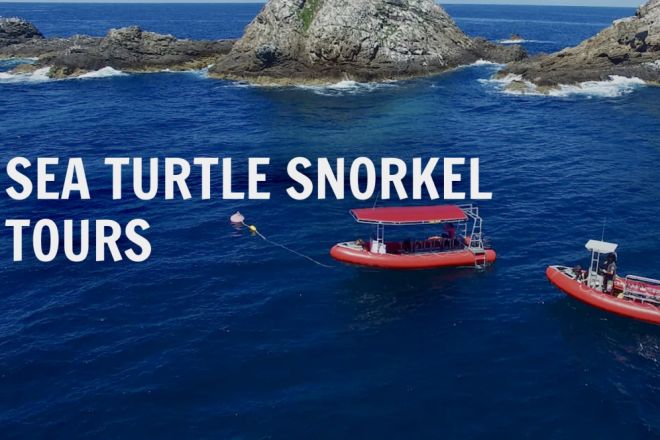In Australia’s internationally-famous lifestyle town “a pretty unique lifestyle business” is up for sale.
According to its broker, Stephen Pursell, if you want a commercial operation in the Bay “but don’t want to get stuck behind a counter all day; if you like the marine life and the outdoors”, the long-established Byron Bay Dive Centre “has everything you need”.
One of only two dive operations in the town, and holding one of only two licenses permitting boats to launch straight off Pass Beach at the tip of Cape Byron, the business that’s been on the market since the beginning of January has already drawn “a mixed bag” of interstate enquiry and “locally-based buyers looking for any business opportunity”.
While Pursell says that so far, the out-of-towners seem to be mainly “[dive] industry-operators looking to extend their reach into this part of NSW”, he expects that as the open-ended expression of interest campaign continues, more locals will emerge.
This is because many new people moved permanently to Byron during the COVID years and are exploring ways of making their living there. “In a town that is hospitality-based, very food and beverage and small independent retail oriented,” says Pursell, “this is unique”.
Established in the ’60s, when Australia’s easternmost village was little more than a butter and beef processing town, Byron Bay Dive Centre has most recently been operating under the management of Perry Bartholomew, who over 20 years has evolved it into a multifaceted, trans-seasonal marine tourism operation.
When the peak months of scuba diving and snorkelling off Julian Rocks begin to tail off, whale watching season (May-November) begins. “It’s a busy operation” says Bartholomew, 45, who says he hooked into a career in marine tourism when “after leaving school, I went to Byron for a gap year and never left”.
Being at the place where the warm waters of the Coral Sea meet the cooler waters of the Tasman, Julian Rocks attracts an amazing variety of sea life and is considered one of Australia’s top-10 diving and snorkelling sites.
“In the busy period we can do 10 trips a day with 12 snorkellers on each craft”, says Bartholomew.
“We have smaller vessels than they do in Cairns, but the dynamic Rocks site is only a five minute boat ride off the beach and doesn’t take a whole day to get there if you want to dive or snorkel.” The ocean swimming can lead to encounters with turtle, sharks, manta rays and whales, which are among the 1000 marine species that have been recorded at Julian Rocks.
Snorkelling and whale watching trips are the more straightforward aspect of the Dive Centre’s business. It also teaches free diving, scuba diving and a 10-day dive master course, which can lead to a career in the ever-growing almost $1 billion Australian recreational diving industry. Bartholomew says “the whole range of dive courses” constitute 15-20 per cent of the business.
None of these options is exactly cheap, but then Byron has a reputation of attracting some of the most cashed-up of the international tourists, who are among the almost two million visitors to the town every year.
Perry Bartholomew who came into the business with partners in 2002 and eventually bought them out, has just sold the central Byron office building he owned and in which the Dive Centre has been housed.
So, the selling proposition is for “the plant and equipment”, the valuable launch licenses (“with nine years left to run”) and the goodwill of a centre that he says has a staffing situation that is “self-sustaining.” Course participants often stick around to gain dive master certificates “and if we like them, they stay on and work for us.”
And yes, they can get accommodation in Byron, he says. “That housing crisis situation has been exaggerated”.
What’s physically for sale in the deal is “a shed load of equipment”. It includes three survey-purpose, rigid-hull inflatable dive vessels, a 12 seater mini-bus, four Land Cruisers for towing, 60 wetsuits, 30 diving regulators, 40 dive cylinders, a $40,000 compressor “and a whole lot of parts and servicing equipment”.
Both Bartholomew and Pursell say there are plenty of options for an office relocation into the hinterland or Byron’s industrial precinct. Both are willing to help the incoming operator find new digs and find their feet in the business.
Why Perry Bartholomew is exiting such an interesting operation that he sees as having a great deal more growth potential in whale watching and snorkelling, is because he’s been developing a parallel career as a firefighter, wants to spend more time with his young family and “surf more and kayak more”.
He has some sailing and kayaking adventure trips that will take him way beyond the bay on his horizon and reckons “I’m a motivated seller, but not a desperate seller”.

